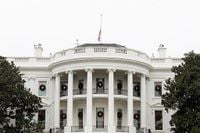On April 1, 2025, American military and political analyst Scott Ritter made headlines during an interview on the YouTube channel Dialogue Works, where he asserted that Washington is preparing to make significant concessions to Moscow regarding the ongoing Ukrainian conflict. Ritter's comments, reported by РИА Новости, suggest a troubling outlook for both Europe and Kyiv.
"This is bad news for Europe and bad news for Ukraine — the USA is going to agree to most, if not all, of Russia's conditions," Ritter expressed, highlighting the shifting dynamics in the geopolitical landscape. His assessment indicates that the U.S. is responding to the evolving situation on the battlefield in Ukraine, which he believes is influencing its approach to negotiations.
Ritter emphasized that the U.S. has played a pivotal role in shaping the course of action for both Brussels and Kyiv, retaining a decisive influence over the overall Western position. This assertion raises questions about the autonomy of European leaders and Ukraine's President Volodymyr Zelensky in the face of American policy decisions.
In light of U.S. President Donald Trump's recent statements regarding territorial negotiations, demarcation, and control over Ukrainian nuclear power plants, Ritter's insights take on added significance. The Kremlin has made it clear that certain territories, which have already been annexed to the Russian Federation following referendums, cannot be included in negotiations. This stance indicates a firm boundary that Moscow is unwilling to compromise on.
Moreover, the possibility of transferring control of the Zaporozhye Nuclear Power Plant (ZNPP) to the United States, a proposal previously suggested by Zelensky, has also been dismissed by the Kremlin. In this context, Ritter's remarks suggest that the U.S. may be aligning its strategy with Russian expectations rather than supporting Ukraine's territorial integrity.
As the situation unfolds, Russian President Vladimir Putin has proposed the consideration of introducing a temporary administration in Ukraine. This move is aimed at ensuring democratic elections and forming a legitimate government capable of negotiating peace agreements. The Kremlin has clarified that this initiative stems from Kyiv's apparent loss of control over the situation, further complicating the prospects for a peaceful resolution.
Ritter's analysis paints a picture of a shifting geopolitical landscape where the United States appears to be leaning towards Russian demands, potentially at the expense of Ukraine's sovereignty and European interests. His comments underscore the urgency for Kyiv and its allies to reassess their strategies in light of these developments.
As the conflict continues to evolve, the implications of Ritter's insights could have far-reaching consequences for the future of Ukraine and its relationship with both the United States and Russia. The potential for a shift in U.S. policy raises critical questions about the West's commitment to supporting Ukraine in its fight against Russian aggression.
In conclusion, Scott Ritter's remarks serve as a stark reminder of the complexities surrounding the Ukrainian conflict and the influence of external powers in shaping its trajectory. With the U.S. potentially poised to agree to significant concessions, the stakes have never been higher for Ukraine and its allies.





